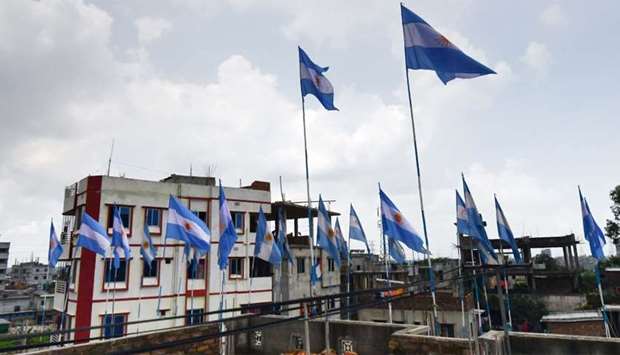The World Cup is arousing high passions in Bangladesh, where machete-wielding fans of Brazil and Argentina have clashed in the streets and flags of the two countries are so ubiquitous that some people want to ban them.
Ignoring the lack of any obvious link to the South American giants, and the absence of their national team -- which is ranked 194th out of 211 teams -- World Cup fever has firmly taken hold among Bangladeshi fans.
Last week in the central town of Bandar, rival followers of Lionel Messi and Neymar fought with machetes, leaving a man and his son critically wounded, police said.
Meanwhile, a 12-year-old boy died after being electrocuted while putting a Brazil flag on a roadside pole.
Argentina and Brazil flags have been dominating towns in the country of 160 million for weeks ahead of the start of the World Cup in Russia on Thursday.
Supporters of the two teams hold flag processions to show their loyalties. In the northern town of Madarganj, motorcycle rallies are staged by hundreds of rival supporters waving football banners.
‘They hold meetings to plan further craziness. You can feel the tension and excitement all over town,’ local police chief Mohammad Rafique told AFP.
Some Bangladeshis want to end the fervour, however.
One lawyer tried to get a court order preventing the flying of flags of World Cup nations. Barisal University in southern Bangladesh has banned its 7,000 students from flying foreign nations' colours on campus.
‘The government should totally ban flying any foreign flags across Bangladesh,’ university head S.M. Imamul Haq told AFP.
Flag fervour is the most obvious sign of the country's switch of allegiance every four years from cricket to football.
Even though Bangladesh has never qualified for the World Cup, and has little chance of doing so in future, the country goes crazy for the tournament once every four years.
- From Maradona to Messi -
The South American rivalry has been traced back to broadcasts of the 1986 World Cup, when Diego Maradona's brilliance helped Argentina win the trophy.
‘Pele was a household name here. His story was in our textbook. So there was a traditional support base for Brazil. But Argentina stole Bangladeshis' hearts after Maradona's solo feats in 1986. I think it is when this rivalry here began,’ M.M. Kaiser, editor of a sports portal, told AFP.
Maqsud Elahi, 13, said after buying an Argentina flag: ‘I support Argentina because of Messi. His dribbling is mind-blowing.’
Tanvir Haider, a 29-year-old doctor, however, fell for Brazil after watching Ronaldo in his boyhood.
‘I love Brazil because of him. Also Brazil has a golden past. Their game is terrific and they have superstars at every World Cup,’ Haider said.
But sociologists struggle to explain Bangladesh's football phenomenon, with one criticising it as ‘a kind of inferiority complex’.
‘Many of these people don't know where Brazil and Argentina are. There is no blood or language connection, still they are mad for them,’ Nehal Karim, a Dhaka University sociology professor, told AFP.
‘I don't understand it,’ he declared.
Mokaddem Hossain, deputy head of Bangladesh Open University, said it was globalisation at work.
‘This is part of worldwide branding. Hoisting flags and the excitement around it is just the result of that passion,’ he said.
Ashif Entaz Rabi, a writer, defended the quadrennial frenzy, saying the World Cup is a joyous occasion for millions.
‘If an Argentina fan finds happiness by flying an Argentine flag on his roof, who are you to stop him from this joy?’ Rabi wrote in a widely shared Facebook comment.

